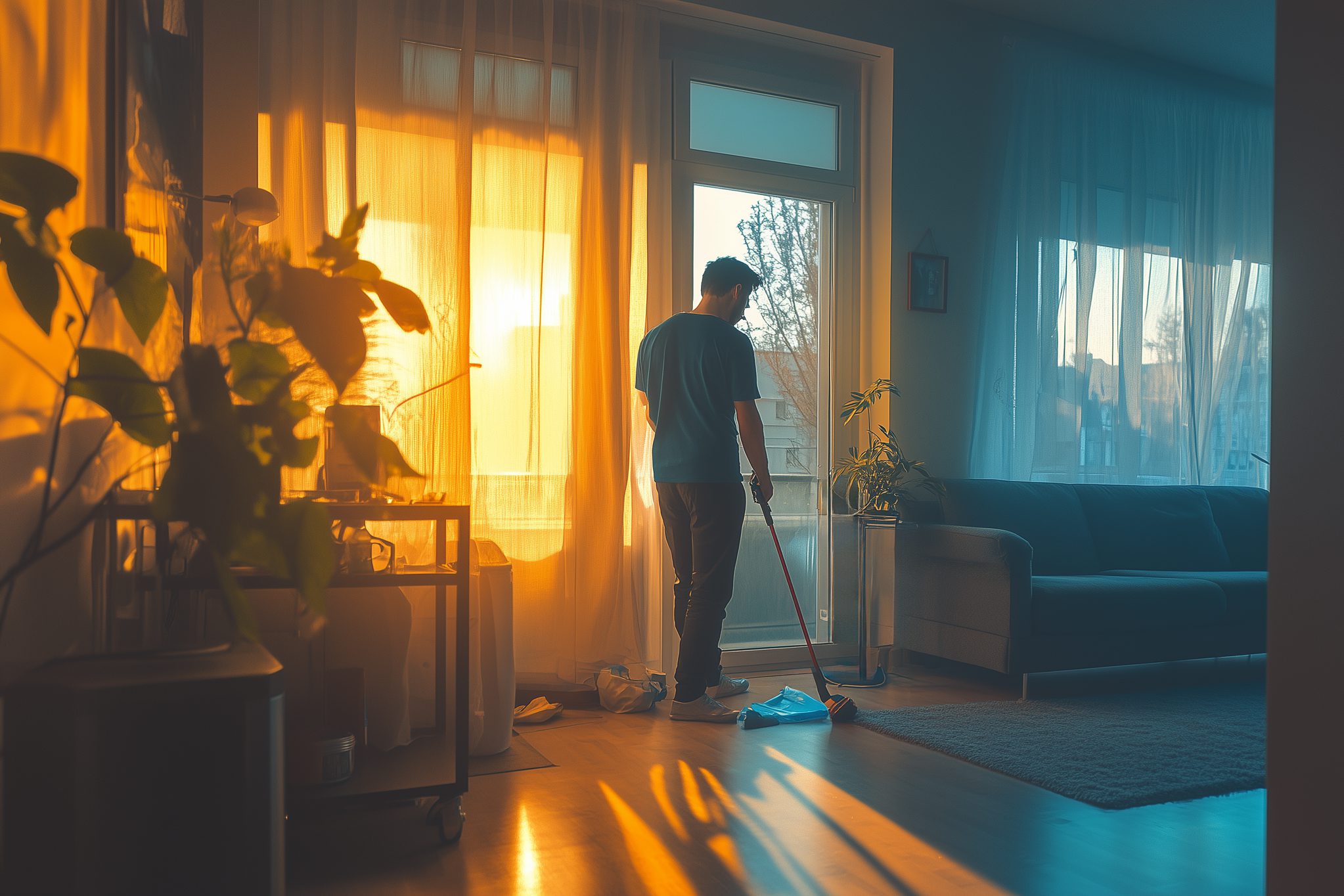
The Connection Between a Clean Home and Better Sleep Quality
Learn about the connection between a clean home and better sleep quality if you're worried about clutter keeping you up at night.

Can a messy house hurt your sleep? You may want to sweep the floors before you settle in for sweet dreams. Research suggests that the state of our homes can actually influence sleep quality. Keep reading to learn the connection between a clean home and better sleep quality.
The Science of Sleeping in a Cluttered Space
A study published by the American Academy of Sleep Medicine found that falling asleep in a cluttered room makes a person more likely to have sleep problems. According to the findings, people who doze off in cluttered spaces are more vulnerable to having trouble falling asleep and experiencing sleep disturbances through the night. Interestingly, this study also found that falling asleep in a messy space increased the risk that a person would go on to develop a hoarding disorder. When explaining this, researchers point out that poor sleep quality slows down thinking and increases risks for depression. Both factors can disrupt a person's decision-making skills when it comes to when to throw out items or how to maintain an organized home.
How Clutter Affects the Body and Brain
Having a cluttered home puts us in a state of stress. The truth is that people who live with clutter tend to "tune it out" after a while. They may think they've "muted" messes that surround them. However, the truth is that messiness and clutter are still very much observed and absorbed by our brains. Research shows that a cluttered home has a strong impact on psychological wellness and perceived well-being.
The true impact of clutter on sleep may come down to the stress clutter triggers. When our bodies are under stress, production of a stress hormone called cortisol increases. Having our homes be the source of stress can be like riding a never-ending cortisol rollercoaster in the very place we're supposed to feel still and relaxed.
One study found that women who perceive their homes to be cluttered tend to have unhealthy patterns of cortisol levels. Along with melatonin, cortisol actually works to regulate the body's sleep-wake cycle. Under normal conditions, our cortisol levels spike during times of wakefulness. Humans experience a sharp increase in cortisol levels just after waking in the morning. This is what's known as the cortisol awakening response (CAR).
When we're under stress, our bodies will release excess cortisol as a defense mechanism. That's our brain assuming that we may need more "energy" and "alertness" as we face threats. You may know this as being in a fight-or-flight state. However, the fight-or-flight instinct is only intended to provide a short-term, immediate dump of cortisol to get us through a threatening situation. When the source of the stress is a messy home or bedroom, we can stay trapped in an ongoing cortisol spike.
According to Harvard Health Publishing, chronic stress is similar to a motor that is left idling on high for too long. It keeps the hypothalamic-pituitary-adrenal (HPA) axis activated. The HPA is a neuroendocrine system that regulates the body's stress response. If we're unable to bring stress levels down, the body will begin experiencing the symptoms of chronic stress. Insomnia has long been linked with elevated cortisol levels. When studying the link between cortisol levels and sleep quality, researchers found that higher pre-sleep cortisol levels predicted subsequent shorter and poorer sleep quality that night.
How Clutter Harms Sleep in Secondary Ways
It makes sense that trying to get to bed in a cluttered, chaotic space would lead to cortisol arousal. However, the mess that surrounds a person daily can also harm sleep in secondary ways. Diet and lifestyle can both be severely impacted by chronic stress and anxiety created by clutter.
High cortisol levels have been shown to make people crave fatty, salty, and sweet foods. That could be a recipe for poor sleep. Researchers have found that eating diets that are heavy in unprocessed food affects a period of deep sleep known as slow-wave sleep. During this phase of sleep, the brain releases bursts of growth hormone that help to boost and repair muscles and soft tissue. It's also notably a very important phase of sleep for boosting memory and cognitive function.
Of course, eating or consuming alcohol before bed as a way to cope with stress can lead to a fitful night of sleep. For example, late meals or snacks containing processed ingredients can lead to heartburn and indigestion that can disrupt sleep. Alcohol's ability to disrupt the release of melatonin is one of the reasons why alcohol consumption is linked with overall poor sleep quality and insomnia. Drinking alcohol also reduces the amount of REM (rapid eye movement) sleep you receive. That means you'll wake up feeling less rested with the same amount of sleep.
Cleaning House: How to Break the Poor Sleep Cycle
What should you do if a messy home is keeping you up at night? It's time to take back control of your space. Here are some tips for making your home and bedroom more conducive to good sleep:
- Make Your Bed Daily: Make a small investment in the sanctity of your room as a sleep space by making your bed as soon as you crawl out of it in the morning. When you return at the end of the day, the neat and orderly bed will signal to you that it's time to rest.
- Remove Clutter From Your Bedroom: It's common for a bedroom to become a dumping ground for items that don't have another place in the house. Over time, we may have piles of odds and ends that loom around our beds like scary shadows in the night. Make an effort to declutter your bedroom to create a more peaceful environment.
- Vacuum and Dust Regularly: Allergens on bedroom surfaces can disrupt sleep. If you're often up late coughing and sneezing, dust and other common bedroom allergens may be to blame. It's not just fabrics that can accumulate dust. Many people overlook dust building up on the tops of ceiling fans or window sills.
- Utilize Scents: While we can't always maintain a perfectly clean home, scents can actually trick our senses into thinking we're in a pristine forest or fresh meadow. For example, a 2021 study looking at the use of essential oil aroma for enhancing slow-wave EEG in sleeping brains found that the smell of lavender may promote low-frequency (theta and delta) brain waves that are linked with deep sleep and improved sleep quality.
Clutter and Sleep Don't Mix
We may think that messes and clutter don't affect our sleep because we don't see them when we close our eyes. In reality, our brains are soaking in clutter during our waking moments. The stress caused by clutter harms sleep quality. Are you curious if you sleep better when your house is clean? Pillow is a resource for tracking your sleep quality. Anyone can use it to see if their sleep patterns change in different environments.

Written by
Emily Mendez
Emily Mendez is a former therapist and mental health author. She is one of the leading voices in mental health. Emily's writing has appeared in eCounseling, SonderMind, and more. Emily is frequently interviewed by Healthline, Fatherly, INSIDER, Family Circle, and other national media for her advice and expert opinion on the latest mental health topics.
Download Pillow
Get help
Press & News
Legal
Connect
X (Twitter)
Company
Copyright © Neybox Digital Ltd.



